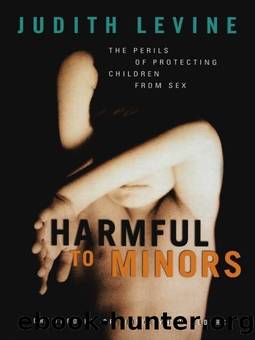Harmful To Minors: The Perils Of Protecting Children From Sex by Judith Levine

Author:Judith Levine [Levine, Judith]
Language: eng
Format: epub
Publisher: Univ Of Minnesota Press
Published: 2002-03-26T07:00:00+00:00
Regret
Of at least one phenomenon we have plenty of evidence: kids are having sex they donât want, and the ones who say they donât want it tend to be girls. In the late 1980s, the prominent sex educator Marian Howard announced that the greatest wish expressed by the eighth-grade girls entering her Atlanta sexuality-ed program was to learn how to say no without hurting a boyâs feelings. In the two decades that have followed, study after study has been released demonstrating that girls are having sex they donât want, that girls who feel good about themselves donât have sex, and that girls who have had sex donât feel good about themselves. In the mid-1990s, it was reported that one in four teenage girls said sheâd been abused or forced to have sex on a date.15
Girls are indisputably the more frequent victims of sexual exploitation and violence. But the gender assumptions articulated by Fine play not only into young peopleâs feelings about themselves and sex but also subtly into the ways these research data are obtained and interpreted. One way gender biases are smuggled into research is under cover of a studyâs definitions, or lack thereof. In one of the above studies, conducted by the prestigious Commonwealth Fund, the questionnaire the girls answered did not define âabuseâ at all. The other, from the highly respected Alan Guttmacher Institute, described abuse as âwhen someone in your family or someone else touches you in a sexual way in a place you did not want to be touched, or does something to you sexually which they shouldnât have done.â16 These studies, in other words, left about an acre of space for unarticulated cultural assumptions to creep in, both the subjectsâ assumptions and their interpreters.â
If girls are not supposed to feel desire and are charged with guarding the sexual gates, were Marian Howardâs students able to conjure any self-respecting, self-protective self-image besides saying no? What, to the Guttmacher respondents, was âsomething. . . they shouldnât have doneâ? Nancy D. Kellogg, at the pediatrics department at the University of Texas, San Antonio, has pointed out that teenagers may use the term abuse for wanted but illegal sex, such as that between an adolescent girl and an adult man.17 Or might these girls desire to be touched by a boy but worry that if it comes to intercourse he wonât put on a condom? If he forces her anyway, it is rape. But fearing the consequences of arousal is not the same as not wanting to be touched.
In 2000, a poll of five hundred twelve- to seventeen-year-olds conducted by the National Campaign to Prevent Teen Pregnancy found that nearly two-thirds of those who had âhad sexâ wished they had waited (the report used the unclear terms had sex and sexually active). Of the girls, 72 percent had regrets, compared with 55 percent of the boys. More than three-quarters of the respondents thought teens should not be âsexually activeâ until after high school.18 A spokesperson for the campaign said the poll was evidence that âmany teens are taking a more cautious attitude toward having sex.
Download
This site does not store any files on its server. We only index and link to content provided by other sites. Please contact the content providers to delete copyright contents if any and email us, we'll remove relevant links or contents immediately.
Rewire Your Anxious Brain by Catherine M. Pittman(18654)
Talking to Strangers by Malcolm Gladwell(13370)
The Art of Thinking Clearly by Rolf Dobelli(10489)
Mindhunter: Inside the FBI's Elite Serial Crime Unit by John E. Douglas & Mark Olshaker(9342)
Becoming Supernatural by Dr. Joe Dispenza(8217)
Change Your Questions, Change Your Life by Marilee Adams(7781)
Nudge - Improving Decisions about Health, Wealth, and Happiness by Thaler Sunstein(7706)
The Road Less Traveled by M. Scott Peck(7603)
The Lost Art of Listening by Michael P. Nichols(7506)
Mastermind: How to Think Like Sherlock Holmes by Maria Konnikova(7347)
Enlightenment Now: The Case for Reason, Science, Humanism, and Progress by Steven Pinker(7313)
Win Bigly by Scott Adams(7197)
The Way of Zen by Alan W. Watts(6614)
Daring Greatly by Brene Brown(6513)
Big Magic: Creative Living Beyond Fear by Elizabeth Gilbert(5771)
Grit by Angela Duckworth(5614)
Ego Is the Enemy by Ryan Holiday(5448)
Men In Love by Nancy Friday(5240)
The Laws of Human Nature by Robert Greene(5208)
